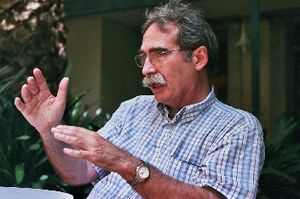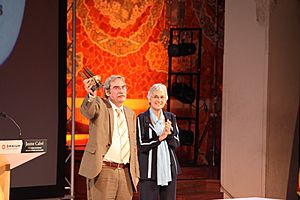Jaume Cabré facts for kids
Jaume Cabré i Fabré (born in 1947) is a famous writer from Catalonia, a region in Spain. He is known for writing novels, screenplays for TV and movies, and for studying languages (he is a philologist). He also helped start a group of Catalan writers called Ofèlia Dracs.
Jaume Cabré was born in Terrassa. He studied Catalan Philology at the University of Barcelona. For many years, he taught in high school and was also a professor at the University of Lleida. He is also part of an important group that studies the Catalan language, the Institut d'Estudis Catalans.
Besides writing books, he has worked a lot in television and film. He helped create and write the first Catalan TV series, La Granja, which aired from 1989 to 1992. He also wrote for other shows like Estació d'Enllaç (1994–1998) and Crims (2000). He wrote scripts for TV movies such as La dama blanca (1987) and Sara (2003). He even wrote movie scripts for films like La teranyina (1990) and Havanera (1993).
Contents
Jaume Cabré's Books and Stories
Early Works
Jaume Cabré started his writing career with two collections of short stories. These were Faules de mal desar (published in 1974) and Toquen a morts (published in 1977).
His first novel, Galceran l'heroi de la guerra negra (1978), introduced themes he would often write about. These included ideas about power and what it means to be human. The main character, Jaume Galceran, is a bandit who becomes an unexpected hero during a historical conflict called the Second Carlist War.
In his second novel, Carn d'olla (1978), a very different character stands out. This is Barringa Barranga, a woman who has built many connections in the Sant Antoni area of Barcelona.
In El mirall i l'ombra (The Mirror and the Shadow—1980), music became an important part of his stories for the first time. This book also made readers think about the value of art, especially music. These ideas would continue to appear in his later works.
In 1980, he wrote a book for young readers called La història que en Roc Pons no coneixia. A year later, he published a short story titled El blauet.
Growing as a Writer
Between 1984 and 1985, Jaume Cabré published three novels that are part of a series called the Cicle de Feixes. He had worked on these books for many years. In 1984, La teranyina was released. This story takes place during a historical event in Barcelona called the Tragic Week. However, the story is set in a made-up city called Feixes, which is based on his hometown, Terrassa. The novel explores how different members of the Rigau family fight for power in politics, business, and their own family.
Also in 1984, he published Fra Junoy o l'agonia dels sons. This novel, like many of Cabré's later works, unfolds slowly. It explores the hidden world of the church in Feixes and a monastery where the main character, Friar Junoy, is a confessor. Music is also very important in this book. Some characters from La teranyina appear here, making it a kind of continuation. Friar Junoy is shown as a victim of those who hold power and can manipulate others.
In 1985, the last part of the Feixes Cycle, Luvowski o la desraó, was published. It was a shorter novel included in a collection of stories called Llibre de preludis. In this collection, music plays an even bigger role.
In 1984, Cabré also published his second book for young people, L'home de Sau.
Major Works
In 1991, Jaume Cabré released Senyoria. This novel is about how power can lead to corruption in the legal system. It is set in Barcelona in the late 1700s. While Fra Junoy showed a victim, Senyoria shows the person in power, Don Rafel Massó, who is a judge. It explores his fears and selfish actions.
L'ombra de l'eunuc (1996) tells the story of Spain's last years under Franquism, the period of change after that, and the years that followed. It is seen through the eyes of the main character, Miquel Gensana. The novel also makes readers think about how art, especially music, is created. The way the story is put together is based on the structure of a famous music piece, Alban Berg's Concerto for violin and orchestra.
While working on his next novel, Cabré also explored other types of writing. In 1999, he published El sentit de la ficció, which is an essay. In this book, he writes about how he creates stories, the process of writing, and even about cooking.
In 2000, he returned to writing fiction with Viatge d'hivern. This is a collection of fourteen short stories that are connected in hidden ways. As readers go through the stories, they discover these links, even though each story takes place in different locations and times. It offers a look at Europe and its history.
The next year, 2001, his play Pluja seca was performed for the first time at the Teatre Nacional de Catalunya. In this play, he wrote about how historical facts can be changed and how history is often written by the winners. The play begins in a castle in Peníscola, which has become a court for a pope who was not recognized by Rome. The story starts on the day this pope, Benedict XIII, dies, and a small group of cardinals decides to choose a new leader.
Les veus del Pamano (2004) starts in the 1940s in a small village in the Pallars Sobirà region of the Catalan Pyrenees. The story continues up to the present day, featuring characters like teachers Oriol Fontelles and Tina Bros, and a woman named Elisenda Vilabrú. This novel explores themes like historical memory, the difficulty of forgiveness, and the fear of forgetting.
In 2005, he published his second essay, La matèria de l'esperit, which is about how people read and understand literature.
His most recent novel, Jo confesso (Confessions), was published in Catalan in 2011. In this book, Jaume Cabré explores the idea of evil throughout human history. He does this through the life of a smart and educated main character who was born in Barcelona after the Spanish Civil War. The English version of this book was published in 2015.
Awards and Recognition
Jaume Cabré has won many important awards for his writing:
- Víctor Català (1973) for Atrafegada calor
- Fastenrath (1980) for Carn d'olla
- Recull (1980) for Tarda lliure
- Serra d'Or Critics (1981) for La història que en Roc Pons no coneixia
- Sant Jordi (1983) for La teranyina
- Prudenci Bertrana (1983) for Fra Junoy o l'agonia dels sons
- Serra d'Or Critics (1985) for Fra Junoy o l'agonia dels sons
- Spanish Critics (1985) for Fra Junoy o l'agonia dels sons
- Crexells (1991)
- Readers of “El Temps” for Senyoria
- Prudenci Bertrana (1992) for Senyoria
- Serra d'Or Critics (1992) for Senyoria
- Spanish Critics (1992) for Senyoria
- Prix Méditerranée (2004) for best foreign novel, Sa Seigneurie
- National Prize of Literature (1992) for La granja
- City of Barcelona (1997) for L'ombra de l'eunuc
- Serra d'Or Critics (1997) for L'ombra de l'eunuc
- Lletra d'Or (1997) for L'ombra de l'eunuc
- Fundació Enciclopèdia Catalana (1999) for Viatge d’hivern
- Crítica Serra d’Or (2001) for Viatge d’hivern
- Catalan writers prize to the literary trajectory (2003)
- Catalan Critics (2005) for Les veus del Pamano
- Premi d'Honor de les Lletres Catalanes (2010)
- Maria Àngels Anglada Prize (2012) for Jo confesso
See also
 In Spanish: Jaume Cabré para niños
In Spanish: Jaume Cabré para niños



